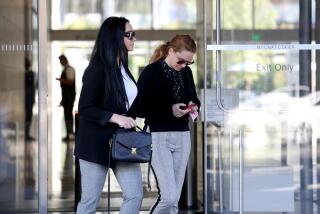A couple’s adoption plans hit a regulatory brick wall
NEW YORK — The 3-year-old girl was found two years ago starving, abandoned and covered in lice in a countryside home in the northeastern European nation of Latvia.
Her name was Kristina. Her parents had abandoned her. Her grandmother, who had taken her in, had frozen to death. Latvian officials classified her as an orphan.
Soon New York residents Ilze and Laurence Earner heard about the girl. Ilze Earner is a nationally renowned child welfare advocate, and she also happened to be a distant relative of Kristina. She had occasionally wired the family money, and Latvian officials came across Earner’s name and phone number on a Western Union receipt.
The Earners decided to adopt Kristina and began a two-year application process.
Last month they traveled to Latvia with their 10-year-old daughter, Maize, and Ilze’s 88-year-old mother to bring Kristina home. But when they arrived at the U.S. Embassy in Latvia, they were told that international adoption laws had changed in April -- and Kristina could not be released.
The Hague Convention on Intercountry Adoption, an agreement involving more than 70 countries, including the U.S., established new accreditation requirements for adoption agencies and new protections against child-trafficking.
The Earners were caught between the old rules and the new ones.
They had filled out the old adoption forms based on U.S. instructions. They were missing the required Latvian documents, but they told officials at the U.S. Citizenship and Immigration Services that they would submit them in May when they arrived in Latvia. Ilze Earner said no one from the department advised her otherwise, so the family booked plane tickets.
They arrived at the U.S. Embassy in Latvia on May 23. Officials told them they had to submit a different application and meet a new set of requirements. There would be a new background check, and the Earners would have to attend classes on the challenges of international adoptions.
With Kristina standing at their side, the Earners’ hearts sank. They fear the process could take months or years.
International adoptions by Americans have dropped in the last three years, State Department statistics show. The decline can be blamed on tougher policies, including the Hague Convention, said Chuck Johnson, vice president at the National Council for Adoption.
He said the Hague Convention was intended to protect children, but there had been a lot of confusion and misinformation about it. Smaller adoption agencies unable to meet the new standards have gone out of business.
The Earners are “caught in a terrible situation,” Johnson said.
He said the Hague Convention had done a lot of good. “But, obviously, adjusting to it has created some hardships across the board in situations like this, where families fell between the cracks and didn’t have updated information,” he said.
Ilze Earner refuses to leave Latvia without Kristina.
“This is kinship, get it? Family. They’re acting like ‘It’s not our problem, she’s not an American,’ ” Earner said in a phone interview from Latvia last week. “I can’t even fathom how they can tell me to leave a 5-year-old behind and go back and start over.”
Kristina could be returned to the home where she was living before the Earners arrived or be sent to an orphanage.
Laurence Earner returned to New York last week. He has been publicizing the family’s cause through videos on YouTube, a blog called Help Bring Kristina Home, and meetings with lawmakers.
One video on YouTube shows Kristina, with yellow and blue ribbons in her hair, sitting on Ilze Earner’s lap in a yard in Latvia. “My government is telling me it’s my problem,” Ilze Earner says. “I don’t think that’s acceptable. I don’t think that represents anything even remotely humane.” After that, her voice chokes with emotion.
Earner, who became a social worker 25 years ago, was born in a refugee camp in France and immigrated to the U.S. with her family in 1956. She received a doctorate and ran an adoption program in East Harlem. She is a professor at Hunter College in New York, specializing in immigrant children’s issues.
“I tell you, the irony is not lost on me,” she said. “Here I am stuck in exactly the kind of disaster that normally I would be on the other side.”
Her daughter, Maize, has been writing a journal. On the family’s second day in Latvia, she wrote of Kristina: “When we went to the ministry of Latvia I know now that she likes to sing and dance. She is healthy and has no vision problems for now. We need to get her tomorrow so now after this stuff we go to the court to give the papers to the judge.”
But Maize is growing restless and is ready to come home.
Earner said her mother -- the sister of Kristina’s grandmother who froze to death -- is weak and getting around in a wheelchair. But “Kristina is an absolute bundle of charm,” Earner said. “I have never met a more resilient kid.”
Back in Brooklyn last week, Laurence Earner called congressmen and lawyers and fired off angry e-mails to government officials.
He said the family could not afford to stay in Latvia much longer. The clock is ticking.
“She’ll have a much better life here,” he said of Kristina. “She’ll have a complete family.”
--
More to Read
Sign up for Essential California
The most important California stories and recommendations in your inbox every morning.
You may occasionally receive promotional content from the Los Angeles Times.










